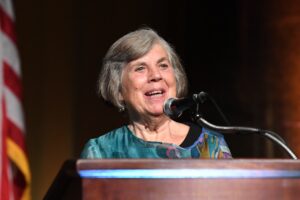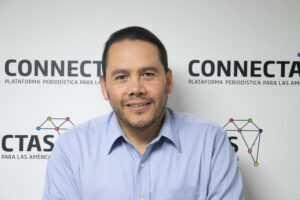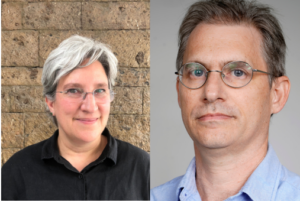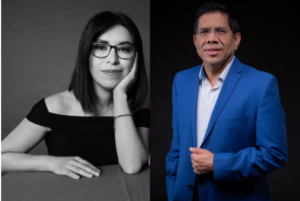This year's Maria Moors Cabot Prize winners have dedicated their careers to covering and explaining Latin America and the Caribbean, including politically complex countries in the region such as Brazil, Colombia, Venezuela, and Mexico.
The Columbia Journalism School announced July 20 that the 2023 Cabot Award Gold Medalists are June Carolyn Erlick, ReVista- Harvard Review of Latin America, United States; Joshua Goodman, Associated Press, United States; Carlos Eduardo Huertas, Connectas, Colombia; and Alejandra Xanic, Quinto Elemento Lab, Mexico.
In addition, the Cabot Jury selected two 2023 Special Citation winners: Miguel Mendoza, independent journalist from Nicaragua, and Nayeli Roldán, Animal Político from Mexico. The citations "honors journalists from Nicaragua and Mexico, countries where independent journalism is under threat, for their commitment and dedication to their work".
The Maria Moors Cabot Prize is the world's oldest international journalism awards, established in 1938 by Columbia University to recognize journalists "for career excellence and coverage of the Western Hemisphere in fostering inter-American understanding.”

June Carolyn Erlick of the ReVista- Harvard Review of Latin America said she is excited to receive the Gold Medal for the 2023 Cabot Prize. (Photo: Columbia University)
The Cabot Award winners, as every year, will individually receive a gold medal and a $5,000 honorarium. The 2023 Cabot Award winners and Special Citations recipients will be honored at Columbia University's Low Library on Wednesday, Oct. 18, according to the official release.
"These honorees represent the best of journalism in the Americas, for their lifetime achievements, their daily reporting, their investigative work and their innovative journalism. Their achievements inspire us all," said Cabot Board Chairman, Rosental Alves.
For June Carolyn Erlick, this recognition represents the culmination of a 50-year career as a reporter, author and editor "from my days covering Cuban immigration in New Jersey to the battlefields of Central America, to my role as editor of a magazine that looks at Latin America and the Caribbean from multiple perspectives," she told LatAm Journalism Review (LJR).
"I am very excited about the announcement and honored to be in such good and distinguished company," Erlick added.
For his part, Colombian journalist Carlos Eduardo Huertas has made important contributions to quality investigative journalism in the region from his beginnings at Semana magazine to his current position at Connectas, the platform he founded and leads.

Carlos Eduardo Huertas is the founder and director of Connectas, a journalism platform that fosters collaboration in 19 countries. (Photo: Columbia University)
The award "is a great endorsement of the work of a daily team and colleagues in 19 countries that, like a large newsroom spread across the continent, has found in the mystique of collaboration, different dimensions of a profession built for years on competition," Huertas told LJR.
"It dovetails with a new stage in the work that for more than a decade has allowed us to present the complexities of this great territory. In fact, the economic recognition that is part of this award will be the seed contribution for a new Fund whose purpose will be to continue promoting good journalism in the Americas," he said.
The jury of the awards highlighted the courage and tenacity of Mexican journalist Alejandra Xanic as part of the reasons for her Gold Medal. They also mentioned her more than 30-year career where she has dedicated herself to uncovering the truth and holding the powerful accountable with far-reaching reporting.
“As the first Mexican awarded the Pulitzer Prize, she has become a leader for a new generation doing investigative reporting in one of the most dangerous countries in the world for journalists,” said the jury in the press release.
Xanic, as co-founder of the Mexican investigative journalism media Quinto Elemento, has been an active advocate for the right of access to information in her country. "Xanic's journalistic talent is matched only by her generosity in sharing her knowledge of Mexico's transparency law," the jury added.

Alejandra Xanic of Quinto Elemento Lab in Mexico and Joshua Goodman of Associated Press in the United States also received Gold Medals in the 2023 Cabot Prize. (Photo credit: Columbia University).
In the case of Joshua Goodman, the jury highlighted his “dogged determination, boundless attention to detail, nuanced storytelling and the wide scope of journalistic knowledge he has,” as reasons for the decision.
For more than two decades, Goodman has explained to a U.S. audience the political and social complexities of Latin America. Although he worked in countries such as Colombia and Brazil, for many years his focus was on Venezuela.
This year the Cabot Prize wanted to honor two countries that have been particularly affected by violence against journalists: Mexico and Nicaragua.
In Mexico, in the first half of 2023 alone, seven journalists have been murdered, and attacks and harassment are constant for those who dare to challenge power.
Nayeli Roldán, recipient of this year's Cabot Prize Special Citation, has faced public attacks from President Andrés Manuel López Obrador because of her work at Animal Político.
"Under such dire conditions, Roldán carried out investigations about corruption, embezzlement, violence against women, and espionage that both gained her respect, and led her to suffer harsh consequences," the jury said of Roldán.
Therefore, Roldán's work earned her the Commendation for being "an example of solid journalism in the face of adversity."
“I feel very honored. I believe this is not just a recognition of me, but rather it’s the means to highlight the complicated situation of the journalistic profession in Mexico. Especially for those who live in the outer regions, those murdered journalists, the precarious nature of the work, and the incessant harassment from those in power,” Roldán told LJR.
Miguel Mendoza of Nicaragua also received a Special Citation, after the Nicaraguan regime stripped him of his nationality and sent him into exile.

Nayeli Roldán of Mexico and Miguel Mendoza of Nicaragua are recipients of the 2023 Cabot Prize Special Citations. (Photo credit: Columbia University)
"Receiving the María Moors Cabot Special Citation is one of the highest honors a journalist can have, because of the great significance and prestige it has worldwide. When I received the news, I was as surprised as I was moved. A little less than six months ago I was imprisoned in Nicaragua by Daniel Ortega's dictatorship, sentenced to nine years in prison for reporting, for being a journalist and for defending my right to free expression," Mendoza told LJR.
Mendoza is the fourth Nicaraguan to be honored in the history of the Cabot Award. He said he receives the recognition on behalf of the independent media and hundreds of journalists who continue to work for Nicaragua from exile.
"I spent 597 days imprisoned, without reading, without informing myself, without learning small details about the outside world, and now I’ll be at Columbia University, receiving this award, sharing with the greats in journalism. Isn't all this surreal?"
*Editor’s note: Rosental Alves, Cabot Board Chair, is founder and director of the Knight Center for Journalism in the Americas, which publishes LatAm Journalism Review.